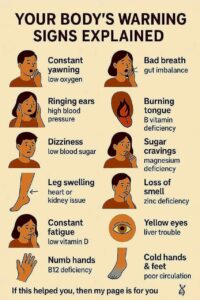
Listen to Your Body: Common Warning Signs and What They Might Mean
Our bodies have a sophisticated way of signaling when something is out of balance. Often, we dismiss minor aches, cravings, or sensations as mere inconveniences. However, these can be important clues about our underlying health.
While this list is a helpful guide, it is crucial to remember that these are potential indicators, not diagnoses. Always consult a healthcare professional for persistent or concerning symptoms.
Here’s a deeper look at some common bodily warnings and what they could be trying to tell you.
1. Constant Yawning: More Than Just Boredom
While linked to tiredness, excessive yawning can be your body’s way of trying to draw in more oxygen. This could point to issues with your breathing during sleep or circulatory problems.
· Potential Link: Low oxygen levels, sleep apnea, chronic fatigue.
2. Persistent Bad Breath: A Gut Feeling
While poor oral hygiene is the most common cause, chronic bad breath (halitosis) that doesn’t resolve with brushing can indicate an imbalance in your gut microbiome or digestive issues like acid reflux.
· Potential Link: Gut imbalance, sinus infections, tooth decay.
3. Ringing in the Ears (Tinnitus)
That phantom ringing, buzzing, or hissing in your ears can be caused by many factors, including exposure to loud noise. However, it can also be linked to elevated blood pressure, which stresses the delicate blood vessels in the inner ear.
· Potential Link: High blood pressure, hearing loss, earwax blockage.
4. Burning Tongue or Mouth Syndrome
A persistent burning sensation on the tongue without an obvious cause can be a direct sign of a nutritional deficiency, particularly in B vitamins like B12, B6, and folate, which are essential for nerve health.
· Potential Link: B vitamin deficiency, dry mouth, oral candidiasis.
5. Dizziness or Lightheadedness
Feeling dizzy, especially between meals, is a classic sign of low blood sugar (hypoglycemia). Your brain is heavily dependent on a steady supply of glucose to function correctly.
· Potential Link: Low blood sugar, dehydration, inner ear problems, low iron.
6. Intense Sugar Cravings
When your body is desperately craving chocolate or candy, it might not be a lack of willpower—it could be a cry for magnesium. Magnesium plays a key role in glucose metabolism, and a deficiency can drive these cravings.
· Potential Link: Magnesium deficiency, poor sleep, stress.
7. Swelling in the Legs and Ankles
Noticeable swelling (edema) can be a sign that your body is retaining fluid. This can be a symptom of the heart working inefficiently or the kidneys not properly filtering waste and extra fluid from the blood.
· Potential Link: Heart or kidney issues, prolonged sitting or standing, high salt intake.
8. Loss of Smell (Anosmia)
A sudden loss of smell is a well-known symptom of certain illnesses like COVID-19. However, a gradual decline can be associated with a zinc deficiency, as zinc is vital for proper function of the senses of smell and taste.
· Potential Link: Zinc deficiency, sinus/nasal diseases, neurological disorders.
9. Constant Fatigue That Won’t Quit
If you’re consistently tired despite getting enough sleep, a vitamin D deficiency could be a factor. Vitamin D is crucial for energy production and cell function, and low levels can lead to profound fatigue and low mood.
· Potential Link: Low Vitamin D, thyroid issues, anemia, chronic stress.
10. Yellowing of the Eyes (Jaundice)
This is a very specific and significant warning sign. The yellow color comes from a buildup of bilirubin, a waste product normally processed by the liver. Yellow eyes are a clear indicator that the liver is struggling.
· Potential Link: Liver trouble (hepatitis, cirrhosis), gallstones, pancreatitis.
11. Numbness or Tingling in Hands and Feet
A persistent “pins and needles” sensation in the extremities is a common sign of nerve damage. Vitamin B12 is essential for maintaining the protective myelin sheath around nerves, and a deficiency can cause this symptom.
· Potential Link: B12 deficiency, diabetes, carpal tunnel syndrome.
12. Constantly Cold Hands and Feet
While some people are naturally colder than others, persistently cold extremities can indicate poor circulation, where warm blood isn’t efficiently reaching the hands and feet. This can be related to anemia, smoking, or thyroid problems.
· Potential Link: Poor circulation, anemia, Raynaud’s syndrome, hypothyroidism.
This list is a starting point for a conversation with your doctor, not a substitute for professional medical advice. Our bodies are complex, and a single symptom can have multiple causes.
